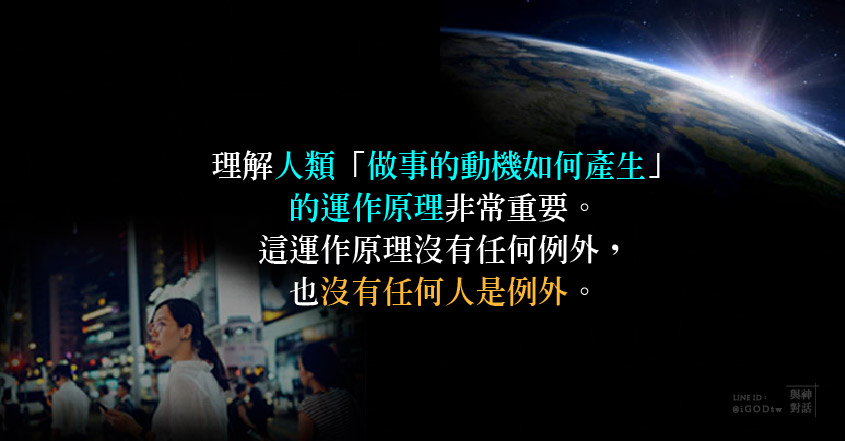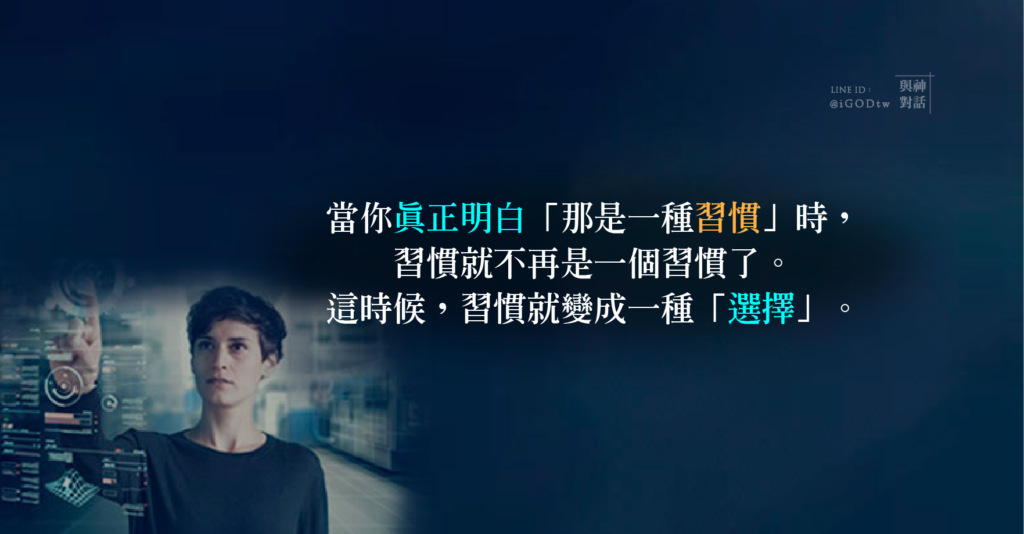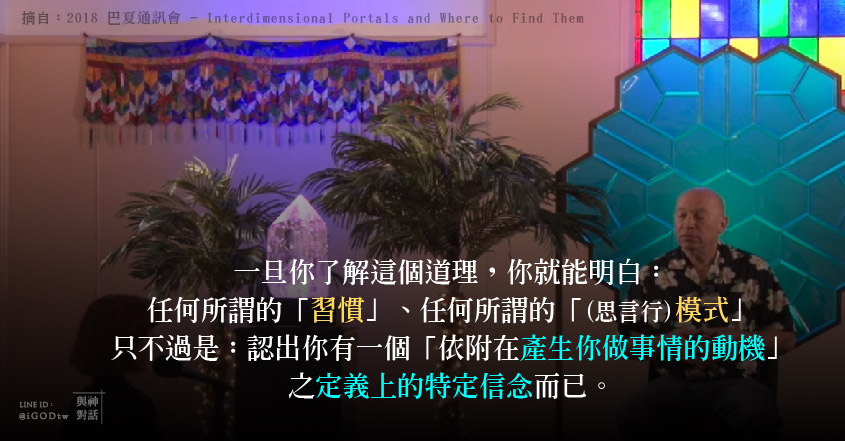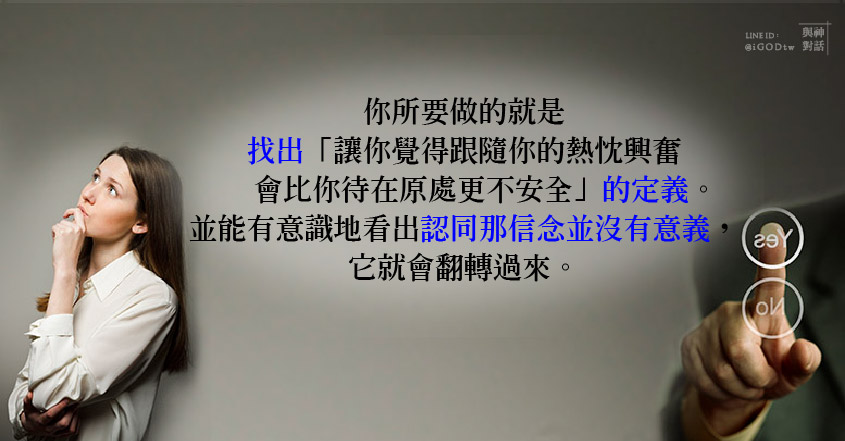【如何將「習慣」變成「選擇」的關鍵秘訣】
巴夏精選短片(7分52秒)【如何將「習慣」變成「選擇」的關鍵秘訣】Bashar341
影片摘自:2018-Interdimensional Portals and Where to Find Them
購買網址:http://www.basharstore.com/interdimensional-portals-and-where-to-find-them/
中文翻譯:Jimmy
【如何將「習慣」變成「選擇」的關鍵秘訣】
Habits are not habits when you know it’s a habit, it becomes a choice.

And I want to talk a little bit about habits and the kits.
我想談一些有關「習慣」和如何運用它的工具。
Habits?
習慣?
Habits, yes.
是的,習慣。
Yes. Well, habits are not habits when you know they’re habits. Then they become choices.
好的。嗯,當你明白「那是一種習慣」時,它就不再是一個習慣了。這時候,「習慣」變成一種「選擇」。(巴夏常說:真正的明白會展現在行為反應上,當一個人尚未在行動上展現時,他還沒有搞懂。)
Yes, and… Um, so if I realize that I have some habitual behavior that… Whether is getting to me to where I wanna to go, or don’t wanna go…
是的,嗯…所以說,當我了解到自己有些習慣上的行為,不論它們是否是我想要的…
Yes.
嗯。
Um, or either wanna amplify it, or not amplify it. Well, if it’s a habit that…Um, it’s not serving me.
亦或是我想放大那樣的行為,或是我不想放大的行為。嗯… 假如它是一個習慣,而且它對我沒有幫助。
Sometimes as I moved forward, I’ll forget to pay attention to the habit, and I’ll slip back into the habit. Are there any tools and techniques for us to…
有時當我持續做我的事,我會忘記注意那習慣,而我又會掉回那舊習慣的模式裡。是否有任何的工具或技巧能幫助我們…
Of course there are.
當然有。
Okay.
好的。
Again, this goes back to the one main technique in understanding that we have talked about many times, and that is understanding the “motivational mechanism” within you.
再次地,這又回到我們先前已多次教導的技巧:了解你內在「做事情的動機如何產生」的運作原理。(可參考【人類做任何事情的「動機如何運作」的原理】)
You have to understand. It’s important to understand how the motivational mechanism works. This is how it works.
你必須了解:明白人類「採取行動與否的動機如何產生」的運作原理,非常重要。因為這是(人類做任何事的) 「動機如何產生、如何運作」的原理。
There are no exceptions to this. Not any of you are in exceptions to this.This is just built into you. It’s part of your being, as a physical mind:
這運作原理沒有任何例外,沒有任何人是例外。這(動機運作機制)只是你們與生俱來已內建的功能,就人類物質心智來說,它是你們生命的一部分。
You always, instantly, immediately, without fail, with-out fail, always choose in the direction of what you believe benefits you. Always! There is no exception to this.
你們永遠是立即地、即刻地、毫無例外地、沒有任何例外地往「你們相信有益於自己」的方向在選擇。永遠是這樣!這一點不會有例外。
You will always choose what you believe benefits you. You will always move away from what you believe does not benefit you. Notice the operative word is “what you believe”.
你們永遠會選擇「你相信什麼是對你有益」的,也會避開「你相信對你是無益」的。請注意這關鍵在於:什麼是「你所相信」的。
Because you may be able to choose what doesn’t benefit you, but the only reason you would realize you’re doing that, is because you have a belief that makes it look like it benefits you more than the alternative.
因為你有可能做出無益於你的選擇,但你會了解你那樣做的唯一原因是:因為你有個「讓你所做的選擇看起來對你更有益」的信念。
Once you understand that, then you can realize that any so-called “habit”, any so-called “pattern” is nothing more than the recognition that you have a particular definitional belief attached to your motivational mechanism.
一旦你明白這個道理,你就能了解:任何所謂的「習慣」、任何所謂的「(思言行)模式」,只不過是:認出你有一個「依附在產生你做事情的動機」之定義上的特定信念而已。
With respect to who it is you truly are that is somehow diminishing your perception of Who You Truly Are, and making it seem as if moving in the direction of your truth would actually be the least beneficial thing.
那些信念以某種方式在消減你對於「你真實的自己」的覺察感知能力,並且讓「朝向你自己內心的真相邁進」看似一件對你實際上幫助最小的事。
So when you figure out what the definition would have to be, to make your excitement seem less than exciting, to make what doesn’t excite you seem more exciting than your excitement, then you will have the key that allows you to then switch those things on the motivational mechanism.
因此,當你弄清楚「你一定是有一個定義」在讓你的熱忱興奮感覺好像較低,在讓原本「不是你有熱忱的事情」看似「你對它更感興奮熱忱」。那麼(在弄清楚自己對該事情的定義後),你將擁有打開「看見自己做這類事情的動機」的萬能鑰匙。
Because once you realize, once you identify what the negative belief is that is dampening your excitement, you will see that it makes no sense. It’s illogical.
因為一旦你領悟、一旦你辨識出「削弱你熱忱興奮的負面信念」是什麼,你會明白發現:負面信念不但沒有道理,也不合邏輯。
You will break the link that that belief has, to your truth, to your excitement, to your passion, because it will no longer make sense to connect that belief to the idea of your passion.
你會打破你與「你相信那是你的真理、你的興奮、你的熱忱」的信念之間的連結,因為「將那些信念和你的熱忱連結在一起」已經不再對你有意義了。
You will realize that it’s probably just a fear-based belief that you bought into, saying: “Well if I did in fact move forward in my best way, my passion, to the best I can, I’m afraid something bad will happen.”
你會了解發現:它可能只是一個以恐懼為基礎的信念,讓你心想:「嗯,要是我真的以我的熱忱盡最大努力向前邁進,恐怕會有不好的事情要發生」。
Therefore, I’m gonna stay exactly where I am. Because even though I might desire to go into the direction of my excitement, my motivational mechanism says that if I do, something worse than what’s going on now will happen.
因此,我要保持原狀。因為,即使我渴望朝著我的熱忱興奮行事,那「產生我做事情的動機運作機制」會告訴我說,假如我真的去做,不好的事會發生。
So I’ll stay where I am as much as I don’t necessarily find it exciting, because I define where I am as safer.
所以,儘管我不一定覺得興奮或有熱忱,我會待在原來的處境,因為我的定義是:我所處的現況比「去改變它」更安全。
See what I’m saying?
聽懂我在說什麼嗎?
…So, when you get a handle on understanding that that’s all you need to do is find that definition that makes your excitement seem less safe than where you are staying. And see that it makes no sense by identifying that belief consciously, then it will flip.
…因此,一旦你找出這訣竅,理解你所要做的就是找出「讓你覺得跟隨你的熱忱興奮會比你待在原處更不安全」的定義。並能有意識地看出認同那信念並沒有意義,那麼,你的看法就會翻轉過來。
Your motivational mechanism will flip.
你採取行動與否的「動機運作機制」也會隨之翻轉。
Because as soon as a belief makes no sense, it’s gone.
因為,一旦一個信念不再合邏輯、有意義時,那信念就會消逝。
That’s the end of the process of letting it go, not the beginning, because you don’t hold onto things that don’t make sense.
那是「放掉信念」的最後一步,而非放掉信念的第一步,因為,你們不會緊抓住沒有道理的東西。
If you keep doing the same thing, if you keep having the same behavior, if you understand how the motivational mechanism works, then doing the same thing what you called the pattern in the habit can only mean one thing: You haven’t found the fundamental belief yet.
如果你一直在做同樣的事情,如果你一直擁有同樣的行為,如果你了解「做事情的動機運作機制」如何運作,但你仍持續做一樣的事情,那代表你口中的習慣模式意指:你還沒有找到自己最根源的信念(即產生某信念的背後的信念,的背後的信念)。
Keep digging! Because as soon as you find the fundamental belief and let that go, all the secondary beliefs that may be connected to it will also collapse.
繼續往內探索吧!因為一旦你找出最根源的信念並放掉那信念,所有因它而衍生的信念都會一起瓦解。
But sometimes, because of the nature of negative beliefs, because they need to perpetuate themselves, because that’s what they designed to do.
然而有時候因為負面信念的本質,因為負面信念需要延續自己被你相信,因為這正是它們設計來發揮的功能。
They may use a little bit of a trick in perpetuating themselves, which means they may surround themselves with other negative beliefs that are secondary negative beliefs, offshoot negative beliefs.
負面信念可能會用一些伎倆來自我延續,也就是將它自己藏在各種其他次要的、衍生而出的負面信念的背後。
So that when you find one of those and let it go, you may think “Oh, I have let go of a fundamental belief and now everything is hunky dory.”
所以,當你遇到這樣的情況並放掉這些負面信念後,你可能心裡想:「噢,我已經放掉一個根源性的負面信念了,現在一切都沒問題了。」
But in fact, they’re still hiding down there, because they’re going: “She fell for it!”
但事實上,它還躲在裡面,暗自竊喜道:「她被我耍了!」
You have to keep digging.
你必須繼續發掘。
The clue is always in your behavior, in your thoughts, and in your emotions, as to whether you have truly let go of the fundamental belief or not.
線索永遠都顯示在你的行為、你的想法和你的情緒上,讓你可覺察你是否真的脫離了最根源的負面信念。
So the habit, the pattern, is nothing more than saying, keep digging and find the fundamental belief that allows you to keep choosing this.
因此,那些(你經常出現的)習慣或模式,只不過是在告訴你:繼續挖掘以找出那「讓你不斷選擇做同樣的事」的最根源信念。
Because you believe it’s in your best interest to do so, and when you reveal to yourself, the nonsensical nature of that belief and break that link, your motivational mechanism will flip. And you will start choosing in the direction what actually serves you, and not in the other direction.
因為你相信那樣做對你是最好的。而當你向自己揭露那信念的荒謬本質,並切斷和它的連結後,你內在做事的動機運作機制就會隨之翻轉。然後你就會往對你真正有幫助的方向做選擇,而非其他方向的選擇。
That’s how it works. Does that make sense?
就是它「如何運作」的方式,聽起來有道理嗎?
Yes, and I want to ask about a specific fun, silly example like: say you sit down to great movie and you open up your favorite bag of cookies, and all of a sudden, you’re eating a whole bag of cookies.
是的,那我想問一個有趣、有點笨的例子:當你坐下來欣賞一部好電影,打開你最喜歡的那包餅乾時,突然間,你發現你把整袋餅乾都被吃完了。
So it’s about going “What am I doing?” And like, stopping yourself, so you…
所以我該自問「我在做什麼呀?」然後阻止自己,這情況你會怎麼…
Ask yourself, yes, “What am I doing?”
反問自己,沒錯,「我在做什麼呀?」
If you believe that what you are doing is not necessarily beneficial to you, but you find yourself doing it, that’s the moment to stop and ask the question.
如果你認為自己正在做的事情並不一定對自己有益,並發現自己在那樣做,那就是你要停下來並且反問自己的時刻。
“Why am I doing this?”
「為什麼我要做這件事?」
What’s the reason I’m choosing to do something that I know may not be too beneficial for me.
我會選擇「做這我明知對我沒幫助的事情」背後的原因是什麼?
Now again, understand that sometimes it might be beneficial, you have to be able to discern the difference of the reason that you’re creating.
再次重申,你必須要能夠辨別「你所創造的不同的理由」之間的差異是什麼,因為有時候能夠辨別可能對你有益。
Because you’ll be able to tell the difference if you’re honest with yourself between excitement and anxiety. And so when you take that moment, and realized what it is you’re doing in your behavior, that’s the whole point of that moment,
因為如果你能誠實面對自己的「熱忱興奮」與「焦慮」,你就能夠辨別其中的差異。所以當你能在發生的當下誠實面對,並覺察到自己在做的行為,那才是整件事情發生的目的(目的是讓你在當下辨識和覺察,而將「習慣」變成「選擇」),
is to take that moment, stopping that moment, examining that moment, exploring that moment, and find out what the reason is. Why you’re choosing to do what you’re doing.
也就是:捉住那個瞬間、留在那個當下、檢視那一片刻、探索那一片刻,然後找出其中原因是什麼,找出「為什麼你會選擇做你正在做的事」的原因。
That will usually reveal the belief that you’re working with.
如此一來通常就會顯露出「你正抱持的信念」是什麼。
And then at that moment you can decide whether or not that belief is in alignment with your truth or the antithesis of your truth.
然後在那當下,你可以決定「這樣的信念是否與你內心的真理相吻合?」或,與你內心的真理背道而馳?
And then from that point forward, if you let it go, your behavior will change.
而如果你選擇放掉那負面信念,從那個時間點起,你的行為將會改變。
The urges will stop.
那些(來自習慣的)催促會停止。
Because you will no longer be living in that state of being, if you use that moment for that reason to explore, examine, and discover what the reason is that you’re doing what you’re doing.
因為如果你善用那當下的片刻去探索、檢視,而發現「為什麼你會做你正在做的事」的原因,你將不再生活在那(習慣的)振頻狀態中。







